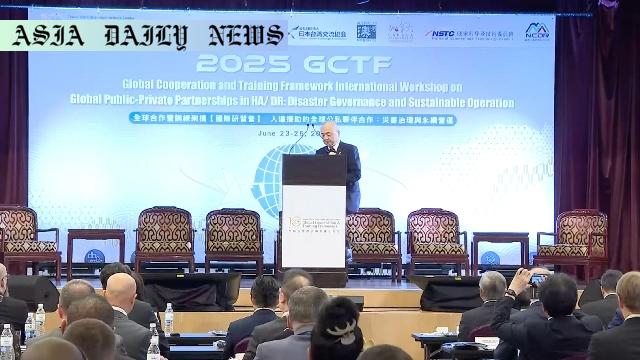Disaster Preparedness – A global workshop in Taiwan unites Japan, Taiwan, and other nations to tackle disaster preparedness effectively.
A global disaster preparedness workshop is held in Taiwan with direct contributions from Japan, emphasizing collaboration and experience sharing.
34 countries and regions are joining to discuss advanced disaster preparedness and visit local organizations excelling in disaster action.
The forum solidifies global partnerships, with Japan, the US, Taiwan, and others prioritizing disaster resiliency through organized efforts.

Introduction: Addressing the Urgency of Disaster Preparedness
Taiwan, a region frequently impacted by severe calamities such as earthquakes and typhoons, is hosting a three-day international workshop on disaster management and preparedness. The workshop, part of the Global Cooperation and Training Framework (GCTF), is spearheaded by Japan and supported by partners such as the United States, Taiwan, Australia, and Canada. Held in Taipei, the event aims to enhance global collaboration on disaster readiness while exchanging innovative approaches to community resilience.
Global Perspectives on Disaster Resilience
More than 150 participants from 34 countries and regions have gathered for this workshop to exchange insights and innovative methods. Disaster preparedness is not only local but a global responsibility that requires a united strategy. The workshop emphasizes the importance of cohesive global partnerships to share successful techniques and mobilize societal efforts during crises. Delegates discuss and analyze practical case studies and visit local organizations known for their disaster response efficiency, such as volunteer groups noted for their swift shelter setups in disaster-hit zones.
Japan and Taiwan’s Collaborative Insights
Japan, one of the GCTF’s lead organizers, shares its extensive experience with disaster management programs, emphasizing its history and expertise in navigating natural calamities. Katayama Kazuyuki, chief representative of the Japan-Taiwan Exchange Association’s Taipei office, highlighted the mutual learning between Japan and Taiwan when responding to disasters. Both countries have implemented structural mechanisms to mobilize society for relief and recovery, fostering resilience to mitigate the impact of potential disasters.
Shaping Strategies for Future Challenges
A crucial aim of the workshop surrounds the development of actionable disaster management strategies that address future challenges, such as climate change’s intensifying natural disasters. Beyond disaster response, the workshop focuses on pre-emptive measures by fostering education, technological integration, and infrastructure reinforcement. This event emphasizes community-level preparedness, teaching citizens the role they play in saving lives and protecting resources before official help arrives.
Taiwan’s Commitment to Disaster Readiness
Taiwanese President Lai Ching-te has prioritized disaster preparedness as a fundamental policy objective, ensuring the nation is adequately equipped for any natural calamity. With international partnerships and localized efforts, his administration aims to solidify Taiwan’s ability to confront emergencies effectively. Japan, the United States, and other participating countries are collectively supporting Taiwan’s efforts by providing resources, expertise, and tools that ensure comprehensive disaster readiness.
The Significance of Global Collaboration
The GCTF disaster readiness initiative highlights the importance of global cooperation in combating the growing threat of natural disasters. With 34 nations and regions coming together for this workshop, it represents an essential milestone in global disaster resilience leadership. By sharing knowledge and technology, the forum strengthens bonds among its members and champions the collective human spirit to emerge stronger from adversity.
Conclusion
The 3-Day Global Disaster Preparedness Workshop represents a significant step forward in unifying world leaders, experts, and volunteers to address the critical issue of disaster readiness. This gathering transcends geographical boundaries and offers actionable solutions that prepare civilizations for the uncertainties of the future. With nations like Japan and Taiwan leading the charge, this forum serves as a prime example of how international collaboration can lead to meaningful, life-saving outcomes.



Commentary
Unity is Crucial Amid Global Calamities
The urgency for comprehensive disaster preparedness cannot be overstated, especially in the face of evolving global challenges. Natural disasters respect no borders, and their consequences echo throughout interconnected nations. Platforms like the GCTF workshop play an integral role in catalyzing collaborations across countries. By sharing experiences and best practices, communities worldwide can learn from one another, gaining valuable tools to mitigate the tangible risks posed by disasters.
Taiwan and Japan as Resilience Innovators
The partnership between Japan and Taiwan in disaster preparedness is a shining example of how region-specific expertise can benefit global efforts. Japan’s long-standing reputation for disaster management tactics, combined with Taiwan’s commitment to enhancing community readiness, creates an invaluable blueprint for others. Both nations showcase how an organized, well-prepared society can effectively minimize the loss of life and property when natural disasters strike.
Broadening Collaborative Horizons
What makes these global workshops even more significant is their ability to include stakeholders from numerous nations. The active participation of 34 countries and regions highlights the collective acknowledgment that disaster preparedness is a universal concern. These initiatives go far beyond theoretical discussions by encouraging on-ground action and fostering strong networks for future crises.
Empowering Local Communities
Ultimately, disaster preparedness boils down to how informed and ready local communities are during times of emergencies. Workshops like the one held in Taiwan create the foundation for stronger societal structures that empower individuals. Whether through the adoption of new technologies, the creation of robust infrastructures, or education campaigns, it is evident that such gatherings equip countries with the knowledge and tools to effectively combat nature’s unpredictability.